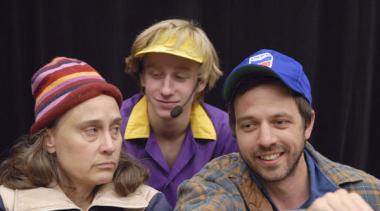Kimberly Akimbo
By David Lindsay-Abaire; directed by Ed Golden. Through July 28 at New Century Theatre, Theater 14, Smith College, 413-587-3933.
This is about those families where the parents are immature and irresponsible, so the kids have to grow up too fast. It happens in families of alcoholics and addicts, but also in "normal" families where the grownups are absorbed in their own needs and pleasures.
In this play's wildly dysfunctional family, it's both. Kimberly's dad is a lush who goes out for "two or three beers" after work and staggers home after midnight. Her mom is an air-brained narcissist who dutifully asks her daughter, "How was school today?" only if she's reminded to.
The play's stunningly whimsical metaphor for this reversal-of-roles syndrome is the title character. Kimberly has progeria, a rare genetic malfunction that makes her age four and a half times faster than normal. She's 16 and looks 70.
If this sounds like the premise for a medical melodrama or grim meditation on fractured family relations, it's most emphatically not. Kimberly Akimbo is one of the funniest sad plays in the modern theater. It never hammers its point and never descends into farce. Regrettably, the current production at New Century Theatre tries too hard to be funny. Opting for a sometimes cartoon-like humor, it misses some of the play's real punch.
Jeannine Haas, the oldest cast member by a couple of decades, plays Kimberly with the bemused resignation of someone who appreciates the irony of her situation. She's a kid trapped in her grandmother's body. Her frustration comes out in sarcastic asides at her parents' infantile antics. Haas' performance is impressive, but I wish she'd put more vinegar into those zingers. Kimberly's derision isn't gentle, it's pissed.
Haas is most affecting in Kim's interactions with Jeff, a classmate who initially takes an interest in her for a school assignment to research a disease. He's also an outcast, a gangly geek who, like her, is shunned and taunted. He's obsessed by word games, especially anagrams. From her name, Kimberly Levaco, he makes "Cleverly Akimbo"—which is what she is: oddly bent and wittily coping.
Young Theo Maltz is appealingly nerdy as Jeff, but he's allowed to be far too goofy, making the character seem more junior high than high school. In fact, director Ed Golden lets too many of the cast get away with the easy impulse instead of the truer, more effective one.
Cate Damon's burlesque sketch of Kimberly's pregnant, hypochondriac mother, Pattie, is frequently very funny, but her over-the-top mugging belongs in a different play. She's like a cartoon in a family photo. More down-to-earth—both the character and the performance—is Brianne Beatrice as Kimberly's nutty aunt Debra, a brassy, scruffy, parasitic petty criminal who leeches off the family and lures Kim and Jeff into one of her larcenous schemes.
David Mason gives the production's anchoring performance. As Kim's father, he captures the play's double-edged thrust of wacky humor and genuine feeling. Buddy is an incorrigible drunk who forgets his daughter's birthday and humiliates her only friend, but who loves and understands her more deeply than anyone else. Mason's finely tuned performance glimpses those depths underneath the man's appalling behavior.
Amy Davis' set simply but effectively encompasses the play's various locations, including the Levaco kitchen—sink piled high with take-out cartons and pizza boxes—and a library that dispenses stern admonitions over the public-address system.
The production is alternately hugely enjoyable and naggingly frustrating. It's a case study in the delights and pitfalls of summer theater. The condensed rehearsal process—nine days from first read-through to opening night—truncates exploration and nuance. Surprisingly often, a production miraculously surmounts those obstacles instead of falling flat. This one straddles a middle ground that shows the play's and the company's potential, but doesn't quite get there.



